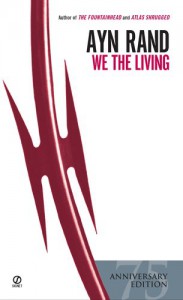
Review: We the Living

If you liked Ayn Rand's other books, you'd like this one too. If you like her politics and enjoy her writing, then this is a must-read because it's practically an autobiography.
If none of the above applies, then this would be an unpleasant experience.
More palatable than Atlas Shrugged and much less root-canal-y than Fountainhead is probably the most accurate way to describe my reaction upon finishing. And I did finish, much to my surprise. It wasn't as unpleasant as I'd been expecting. I'd expected to struggle with this book, not because Ayn Rand's philosophy is hard to understand, but because it's Ayn Rand and she has a way of making her books unpleasant.
Unlike Rand's other books, there's an actual story in this one that's neither convoluted nor unbelievable, and that's because it's Rand's life story. At times, however, there are moments where you can see the wheels in her propaganda-writing mind turning. Her expositions become long-winded and overwrought with description after description of how much more difficult life is under Soviet rule and how much injustice is in the system and how unfair the rations are and how hungry the people have become and how much has already been taken from Kira's/Rand's family, life, future. The point to keep in mind here is the quantity of suffering. The reader is left with the question: how much more can Ayn Rand squeeze into the narration to get her point across?
Although this is a novel, it never felt like a novel to me. There is the main story that follows an idealistic young woman, Kira, from the shunned middle class who fights the system by going along with it only to find a way to fight against it. As she and her family return to the city after the revolution, they are displaced, disenfranchised, and robbed of their livelihood (her father's textile mill is nationalized) all because they used to be financially well-off. Rand explains in detail every time the main character encounters a particularly crippling situation, like having her home taken away and a family of five living off of two food ration cards. Her expositions get in the way of the story and she overdoes them every time, but without them, you wouldn't fully understand how the system worked. So there's that.
(show spoiler)
If you're looking for a book that has similar themes and subject matter but you want to avoid Ayn Rand altogether, I'd suggest Doctor Zhivago. More heart and ambiguity, less in-your-face propaganda. But according to my father who has read both books, lived in a Communist state, and experienced firsthand many of the events described in the books, Rand's is closer to the truth in terms of portraying the unfairness and biases of the system. I still think she overdoes a lot of it though. Perhaps that's another metaphor for Soviet brutality.












